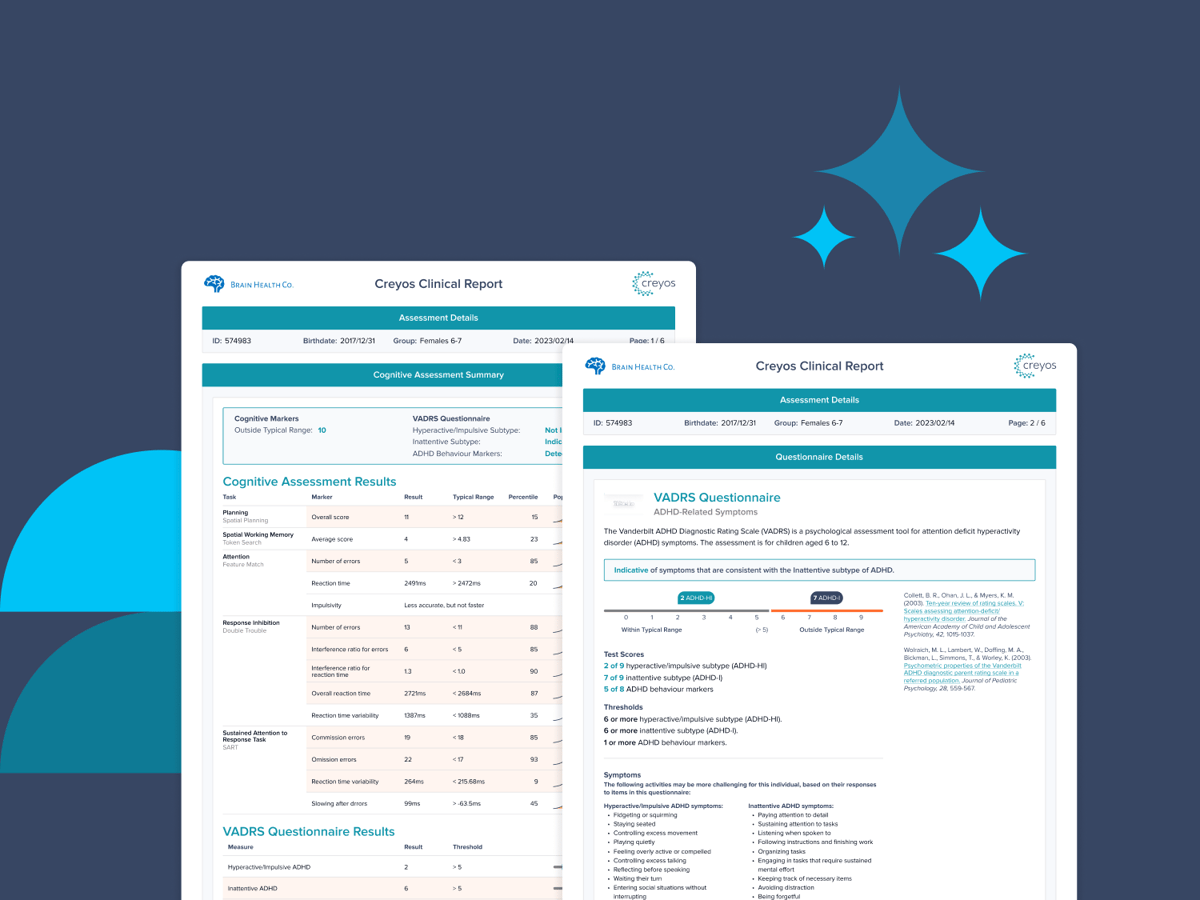
The Creyos ADHD Cognitive Assessment and Automated Report
The prevalence of attention deficit hyperactivity disorder...
Read article
Administer the ASRS Part A in Creyos Health on its own or as part of the Creyos ADHD-focused protocol to help identify and understand ADHD symptoms in adult patients.

Administer the ASRS Part A in-clinic or remotely to increase access to care. Pair with web-based cognitive testing for a more complete picture of patient health.

Reduce administration and scoring time with instantly generated, easy-to-interpret reports to spend more time focused on patients.

Quickly identify attention-related concerns and track changes over time with validated tools to support data-driven care.
The ASRS Part A is a quick, validated screener designed to help identify adult ADHD. Available as a standalone digitally-delivered tool or as part of the ADHD-focused protocol on the Creyos platform, it pairs self-reported symptom information with objective cognitive testing for a more complete view of ADHD-related functioning. Learn more about digital delivery and web-based ADHD assessment by speaking with a product specialist.

Approximately 50% of individuals diagnosed with ADHD in childhood continue to experience related symptoms into adulthood. Many more struggle with the condition without formal diagnosis or treatment, leading to cognitive deficits in areas related to executive functions, such as planning, organizing, decision-making, and self-control. These impairments can have far-reaching consequences, affecting education, career paths, relationships, and overall well-being.
The first step toward helping people with ADHD to be successful academically, professionally, and personally is accurate detection, laying the foundation for targeted support and effective treatment.
Source: Substance Abuse and Mental Health Services Administration, 2024
The ASRS Part A screener, available for digital administration through Creyos, consists of the first six questions most predictive of adult ADHD, based on diagnostic criteria from the Diagnostic and Statistical Manual of Mental Disorders (DSM).
When administered alongside measures of cognitive performance, it allows clinicians to:

Attentional difficulties that arise or persist into adulthood are associated with a wide range of outcomes that cause challenges in day-to-day life, such as depression, anxiety, substance abuse, learning disabilities, and career difficulties.
Source: Uchida et al., 2015
The purpose of the ASRS Part A screener is to help identify ADHD symptoms in adults.
The ASRS Part A screener contains six questions related to symptoms consistent with ADHD. It can be administered in-clinic through the Creyos Health platform or remotely through a personalized assessment link.
ASRS Part A scores are instantly tabulated and laid out in an easy-to-interpret report.
When administered as part of the Creyos ADHD protocol, objective cognitive testing is bundled with self-reported symptoms from the ASRS Part A. Comparing the results can help build a more comprehensive understanding of a patient's functioning.

Evaluating ADHD symptoms is not exclusively for healthcare providers focusing directly on ADHD treatment, such as primary care providers and paediatricians.
Many healthcare providers like Given the prevalence of mental health comorbidities with ADHD, practitioners such as psychiatrists, clinical psychologists, neurologists, addiction specialists, and occupational therapists may find value in measuring adult ADHD in order to better explain and treat comorbid disorders.
The ASRS Part A can be administered on its own or as part of the ADHD condition-focused protocol for a robust assessment that combines age-appropriate questionnaires and cognitive performance measures. The results are automatically assembled in a complete report to indicate 14 objective markers of ADHD in addition to the ASRS Part A screener results.
When a patient completes the ADHD-focused protocol, providers get immediate insights through easy-to-read reports that combine questionnaire data with cognitive test results for a full picture of patient brain health. Creyos can also integrate with a variety of EHRs to automatically collect, score, and organize results from each questionnaire and assessment in a patient’s existing chart.
The ASRS assessment evaluates behaviors related to ADHD, including inattention (difficulty focusing, staying organized, and following through on tasks), hyperactivity (excessive energy, restlessness, and fidgeting), and impulsivity (acting without thinking, interrupting others, and difficulty waiting).

The prevalence of attention deficit hyperactivity disorder...
Read article

Can a brain scan show the differences between the brain of...
Read article

Attention deficit hyperactivity disorder (ADHD) is not only...
Read article